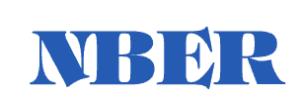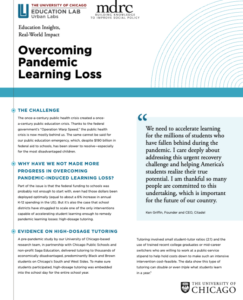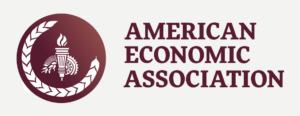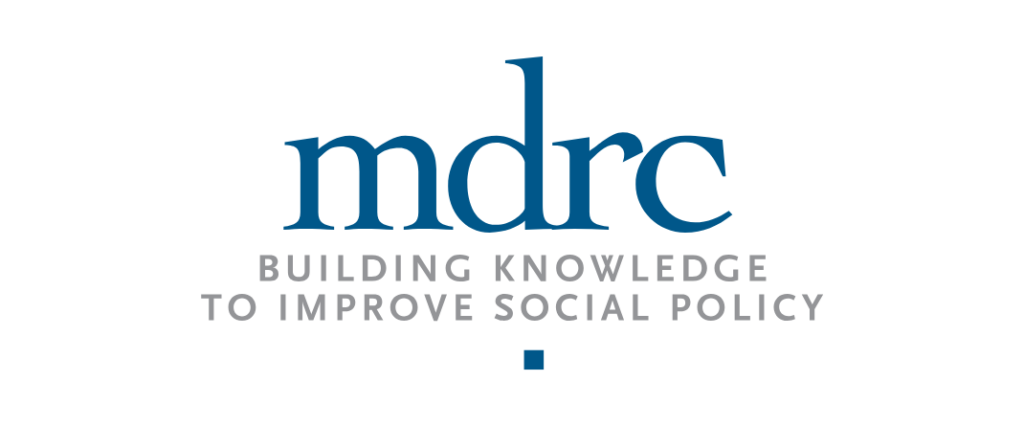Aug 2024
How to Build It and Ensure They Will Come: Educators’ Advice on High-Dosage Tutoring Programs
Topics
Projects
This brief aims to elevate the perspectives of school staff members and tutors at schools that are part of PLI to deepen the field’s understanding of the challenges schools face in delivering a high dosage of tutoring to their students and strategies they use to overcome them.
Hearing from people who are directly involved in the delivery of tutoring programs can surface new and innovative ideas and can help to ensure that they are feasible for school staff members to implement.
High-dosage tutoring—defined as consistently scheduled tutorials during the school day in which students work with a trained tutor in small groups (for example, four students to one tutor) at least three times per week—is now widely recognized as being among the most promising educational interventions for improving student learning.
Recent national data show that over 80 percent of public schools offer some form of tutoring and nearly 40 percent offer a tutoring program that can be considered high dosage. Despite their appeal, high-dosage tutoring programs can be challenging to deliver well; in particular, research has shown that ensuring students can participate in the expected number of tutoring sessions per week is a common obstacle. Students can only benefit from tutoring interventions if they are able to attend. Thus, it is critical to identify and address the barriers schools face to delivering a truly high dosage of tutoring.
The Personalized Learning Initiative (PLI)—led by the University of Chicago Education Lab in collaboration with MDRC—seeks to understand whether and how school districts can expand the benefits of high-dosage tutoring and more affordable alternatives. Recent research has explored district leaders’ and tutoring vendors’ perspectives on what affects students’ receipt of tutoring services. This research has identified challenges with scheduling, tutor attendance, and reliable data tracking as barriers to students receiving the intended dosage.
Topics
Projects

NBER Working Paper: Can Technology Facilitate Scale? Evidence from a Randomized Evaluation of High Dosage Tutoring
This paper outlines results from the Education Lab’s study of a high-dosage tutoring model–what we call “Saga Technology”–which found that substituting some tutor time with educational technology can reduce costs by one-third and halve the number of tutors needed without compromising effectiveness.
Realizing the Promise of High Dosage Tutoring at Scale: Preliminary Evidence for the Field
This technical report outlines preliminary results from the Personalized Learning Initiative showing that high dosage tutoring can be scaled and can work–even when delivered in the aftermath of the pandemic and in diverse academic settings.

Personalized Learning Initiative Research Brief
Overview of the Personalized Learning Initiative, a nationwide R&D initiative to scale the benefits of tutoring.

Not Too Late: Improving Academic Outcomes Among Adolescents
Read our academic paper on the early Saga studies published in the American Economic Review.
Latest Updates
Commentary: Counterintuitive strategies for overcoming pandemic learning loss with high-dosage tutoring
The Education Lab’s Monica Bhatt, Jon Guryan, and Jens Ludwig outline strategies for schools and districts to overcome pandemic-induced learning loss and highlight results from our study of a high-dosage tutoring model–what we call “Saga Technology.”

Expanding a City-Wide Tutoring Effort: Lessons from Chicago Public Schools
Read a blog post from the Education Lab’s research partners at MDRC about our work to help expand tutoring programs in Chicago Public Schools as a part of the Personalized Learning Initiative (PLI).

Tutoring Lessons from New Mexico
MDRC’s Rachel McCormick, Janey Woo, Ben Steiner, and Jean Grossman cover how the Personalized Learning Initiative aims to transform educational outcomes in New Mexico through targeted tutoring programs.

